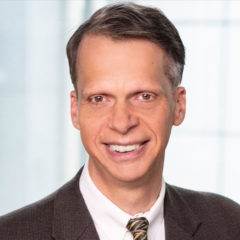Fear is a powerful force. Fear for her daughter’s safety drove my sister to take a bullet to protect my niece from a carjacker. Fear of raising their children in a “culture of violence” led friends of mine to relocate to another country.
While some fear is an important survival mechanism — life has risks that need to be considered — too much is corrosive. Chronic fear damages physical and mental health, memory, and brain processing.
At the collective level, persistent fear can lead to the fraying of society.
Fear was the tectonic force in the election cycle we just completed. Its manifestation varied. It surfaced as fear of strangers; fear of economic instability; fear of the future; fear of difference; fear of authoritarianism; fear for personal safety; fear of change. Our fears are what currently unite us and divide us.
What is the cure for such deep-seated, widespread fear? The election results suggest that, for many, the solution is centralized power and authority — one individual’s projected personal strength will bring authority, order, and security.
Hope in a better future is essential for driving out fear but unchecked authority’s track record for delivering it is not good. Power corrodes. Human dignity gets trampled, especially for those without social status or political or economic power. Life, liberty, and the pursuit of happiness become easier for a few and harder for most. Fear does not diminish — it increases.
If not authority, then what will reduce fear and produce hope? It is not simply a commitment to change, more appealing public policies, or effective political strategies. Strategies to shore up institutions and foil authoritarianism are necessary but not sufficient. Lessening fear starts with looking in the mirror and then rebuilding personal and collective trust.
First, each of us must acknowledge our own fears. As a white male with a good (OK, great) job, I worry less about personal attacks or economic instability than many others, but I am scared as hell about the mess we are handing to the next generation. Others have more proximate fears. A friend wrote me in the aftermath of the election: “I am afraid for my marriage, afraid for the future of nieces and nephews as humans who are not White. I also am sad to admit that I am afraid for my personal safety.”
Then we have an obligation to acknowledge the fears of others. This is where many of us get stuck. We wallow with those who share our fears and minimize the concerns of those we disagree with, or more seriously, we fail to even acknowledge their fears as legitimate. By virtue of their existence, these fears are legitimate. While we may not share others’ fears, by virtue of their dignity as human beings, we need to understand and respect their concerns.
Social media, and more generally the web, has not been our friend here. It encourages outrage to enhance revenues and enables us to consort with the likeminded in ideological silos and disparage others from the protection of our digital chasms. It is contributing to a loss of the habits and skills of moderation and exchange.
On the other hand, acts of compassion for strangers, such as helping victims of a natural disaster, as my colleague Morgan McDonald wrote about recently, are a superpowered remedy for isolation and fear.
Only by having these authentic exchanges — be they everyday encounters or in extremis — and by acknowledging one another’s fears as legitimate can a modicum of trust be established between people. With trust comes durable hope, and with hope, comes the chance for real change. This type of work is hard and takes persistence, appreciation, and perspective. It is love made tangible and gritty. But it can result in improvements that benefit everybody, not the easy, false hopes and deep harms of authoritarianism.
Acknowledging fear, building trust, and fostering hope are essential to good philanthropy, good health care, and good health policy as well. The Milbank Memorial Fund has learned this firsthand as we have confronted the generations of distrust we helped engender with our participation in the study of untreated syphilis in Tuskegee and Macon Country, Alabama. Only by confronting our fears of the possible consequences of a public apology was trust-building and the hope of reconciliation and forgiveness from the Voices for Our Fathers Legacy Foundation made possible.
Caregivers and health systems must also earn a fearful patient’s trust — with competence, consistency, and empathy — if hope of healing is to occur. And government institutions, which suffer from significant public distrust, need to build trust with competent, consistent, and empathetic leadership to foster hope in their constituents.
We at Milbank are indeed fearful about the possibility of a more authoritarian and politically polarized country. But we will work hard to earn the trust of the health leaders with whom we collaborate to improve population health and health equity. We are proud and honored to help them earn the trust of the people they serve. That gives us hope.


